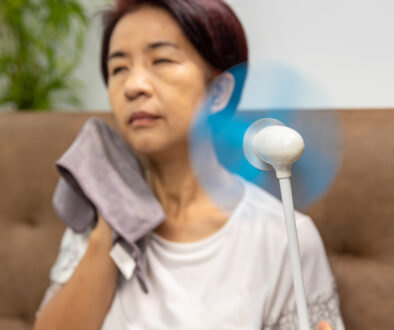We Answer Your FAQs About Menopause
In honor of World Menopause Month, we want to break down a lot of the myths and misconceptions about it by showcasing some of the most frequently asked questions we’ve received about menopause.
“We want our patients to know that we are here for them through all phases of life,” said Dr. Miller. “Menopause can be a challenging time. It can present some new health issues. During this time of transition, it’s even more important for us to work closely together to ensure you’re living the healthiest life possible.”
Frequently Asked Questions About Menopause
What Is Menopause?
Menopause is the time of life when you no longer have periods because your ovaries have stopped making significant amounts of estrogen and progesterone.
Menopause is a natural progression in a woman’s life. It’s not a disease.
Technically, menopause is confirmed when you have not had a period for 12 months.
Perimenopause is the phase that precedes menopause.
What Is the Average Age of Menopause?
This occurs, on average, at age 51. However, it can range between the ages of 45 and 55.
It’s also important to note that a woman may enter menopause early, particularly if she’s had to have a hysterectomy or other procedure that has affected her reproductive system.
What Can I Do About Menopausal Symptoms?
Many women experience symptoms such as insomnia, hot flashes and vaginal dryness that often accompany menopause.
We’ve helped hundreds of women address postmenopausal symptoms by creating a tailored approach to personalized health care.
Often, estrogen therapy is very successful.
Natural supplements such as black cohosh, soy and other herbal remedies have been used to relieve menopausal symptoms—but we would like to provide a word of caution. These products are not regulated by the Food and Drug Administration, therefore there is limited data regarding the safety and efficacy of some of these products.
Does Menopause Cause Depression?
Not necessarily.
The hormonal fluctuations which are common during perimenopause and early menopause are unpredictable. These changes plus disrupted sleep, loss of fertility, and changes in body image can all contribute to new or worsening depression. Many women do report increased moodiness, stress, anxiety and depression during perimenopause and menopause.
If you’ve had bad cases of PMS or PMDD, you may be at greater risk of developing depressive symptoms.
If you have been diagnosed with bipolar disorder or depressive disorder, menopause may exacerbate these underlying medical issues.
We want you to know that we care about both your physical and mental health. If you are stressed or anxious, please let us know. We will work together with you to alleviate your symptoms and help you.
If you are having any of the following symptoms, please reach out to us:
- Persistent feelings of sadness, hopelessness or irritability
- Low appetite or overeating
- Oversleeping or insomnia
- Overwhelming fatigue and lack of motivation
- Loss of interest in activities previously enjoyed
- Difficulty making decisions and absorbing information
- Thoughts of suicide
Will Menopause Cause Me to Gain Weight?
Again, not necessarily. However, on average, women gain five pounds after menopause, which may be due to lower estrogen levels.
A slower metabolism and loss of muscle mass are common in menopause and can also contribute to weight gain.
The best option is to continue living a healthy lifestyle through healthy nutrition and regular exercise. If you’re already doing so, we salute you! If you’re not sure where to start, we’ll be happy to help. Remember that even the smallest improvements can have an impact on your overall health.
How Does Menopause Affect My Overall Health?
This is a fantastic question. The hormonal changes that mark menopause also signal a good time to reassess and reevaluate your health care.
For example:
Less estrogen in your system means you could be at greater risk for osteoporosis which can lead to serious bone fractures.
In addition, research shows that low levels of estrogen in your body could possibly affect cholesterol build-up in your arteries. As a result, you could be at greater risk of a heart attack or stroke.
We encourage all our patients who have entered menopause to schedule an appointment for us to evaluate your health risks for:
- Osteoporosis
- Urinary incontinence
- Vaginal pain or itching
What About Sex After Menopause?
Many patients continue to have active and satisfying sex after menopause, although it can present some challenges.
Sometimes, vaginal dryness that occurs after menopause can make sex uncomfortable. You may also find your sex drive waxing and waning during this time.
We believe that your sexual health is an important facet of your overall health. We will work with you to improve your experience with sex after menopause.
If you’re worried about your sex drive we can help. Just talk to us!
Compassionate Care for Every Age
Whether you’re having your first gynecological exam, are interested in IUD insertion or you’re nearing menopause, our doctors and health care professionals are dedicated to providing the personalized treatment you deserve with access to the state-of-the-art care and equipment you’d expect at larger research universities.
Contact us to schedule your appointment today. We would consider it an honor to be partners in your care.
For more than 40 years, Chapel Hill OBGYN has served women in the Triangle area, sharing the joy of little miracles and supporting them during challenges. Our board-certified physicians and certified nurse midwives bring together the personal experience and convenience of a private practice with the state-of-the-art resources found at larger organizations. To schedule an appointment, please contact us for more information.




